Resume
Nurse Case Manager Cover Letter Examples

May 29, 2025
|
12 min read
Master the art of crafting a nurse case manager cover letter that diagnoses your strengths and presents them with precision. Discover tips to bandage your resume's weaknesses and make a healthy impression on your future employer.
4.70 Average rating
Rated by 348 people
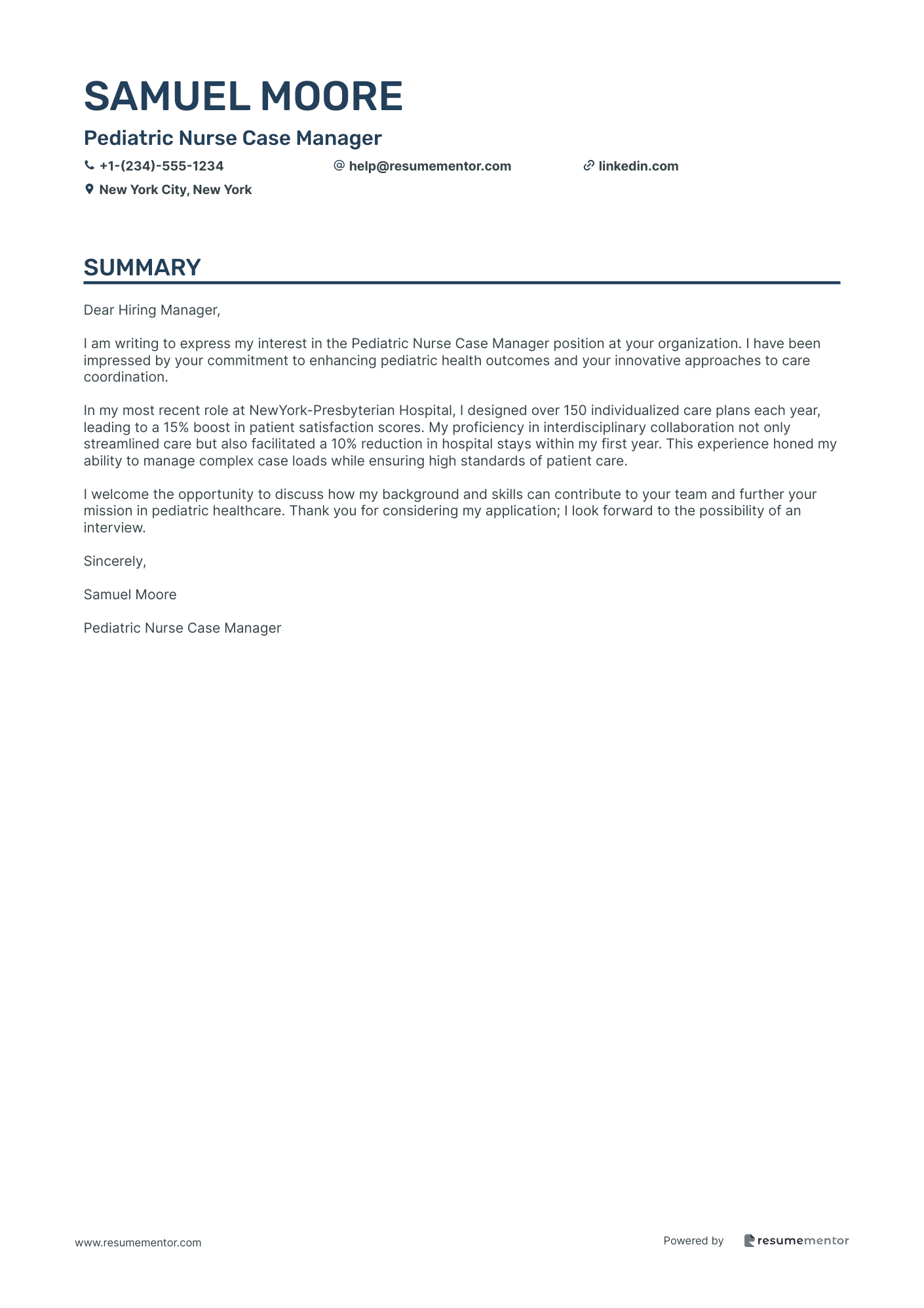
Pediatric Nurse Case Manager
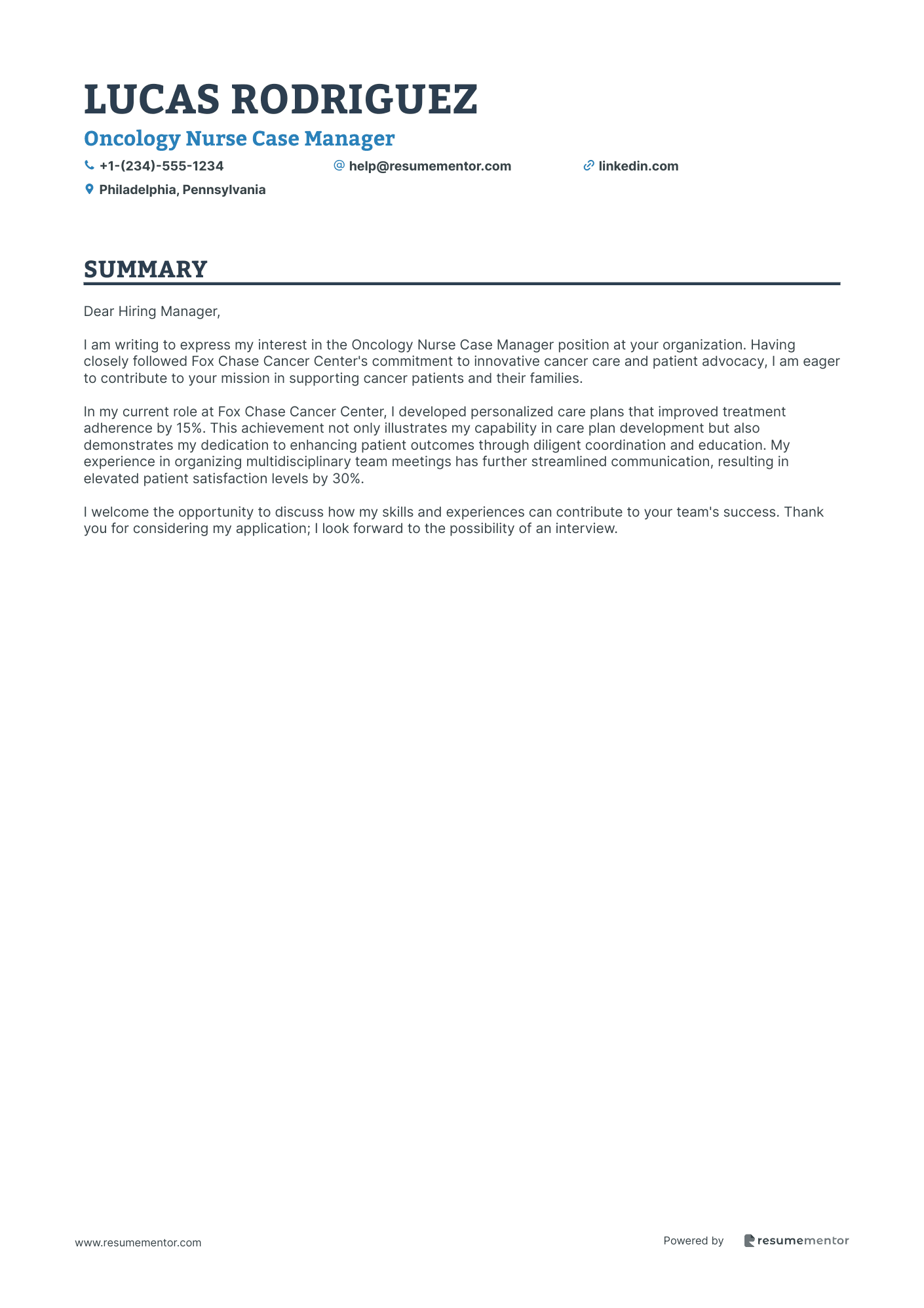
Oncology Nurse Case Manager
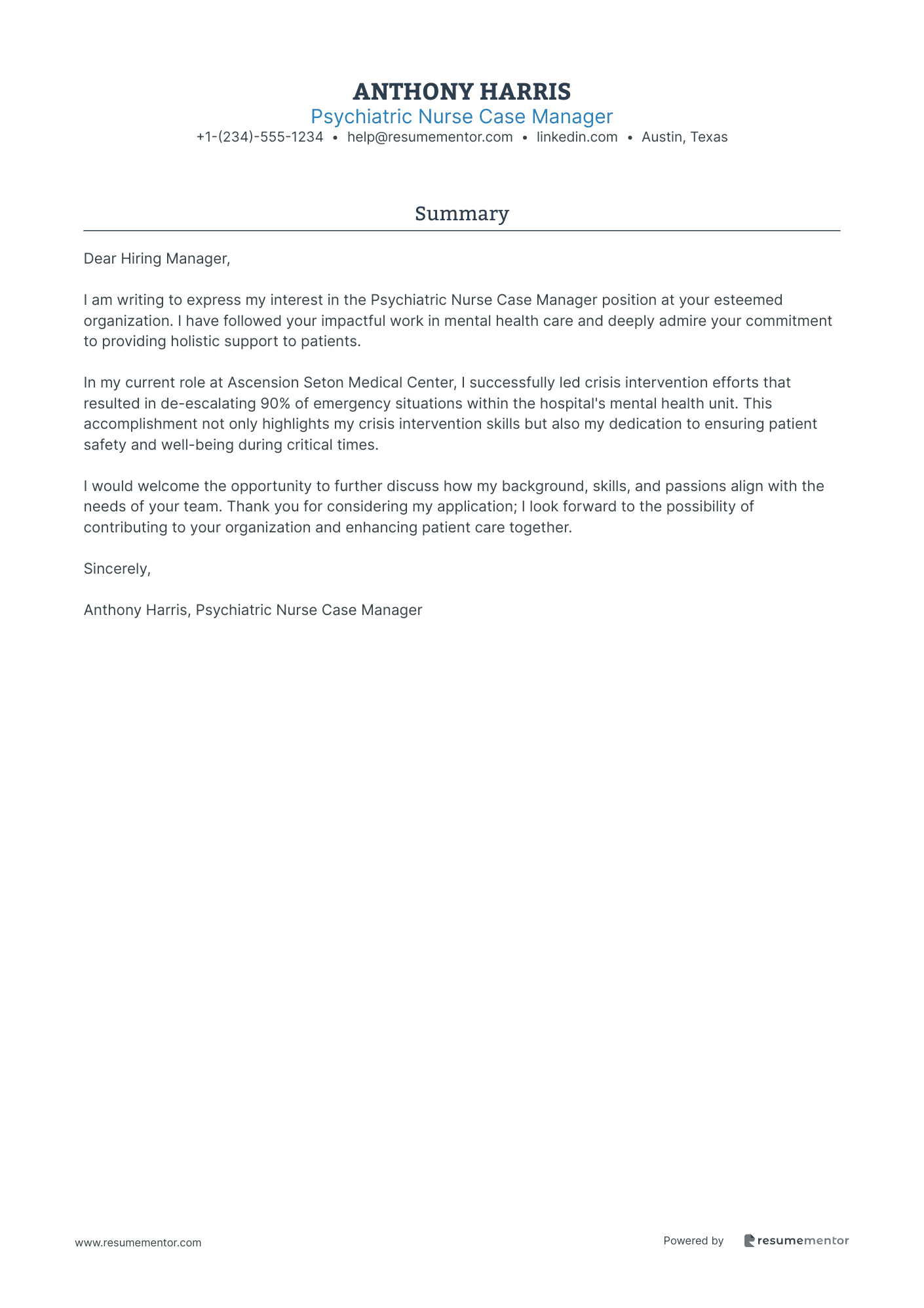
Psychiatric Nurse Case Manager
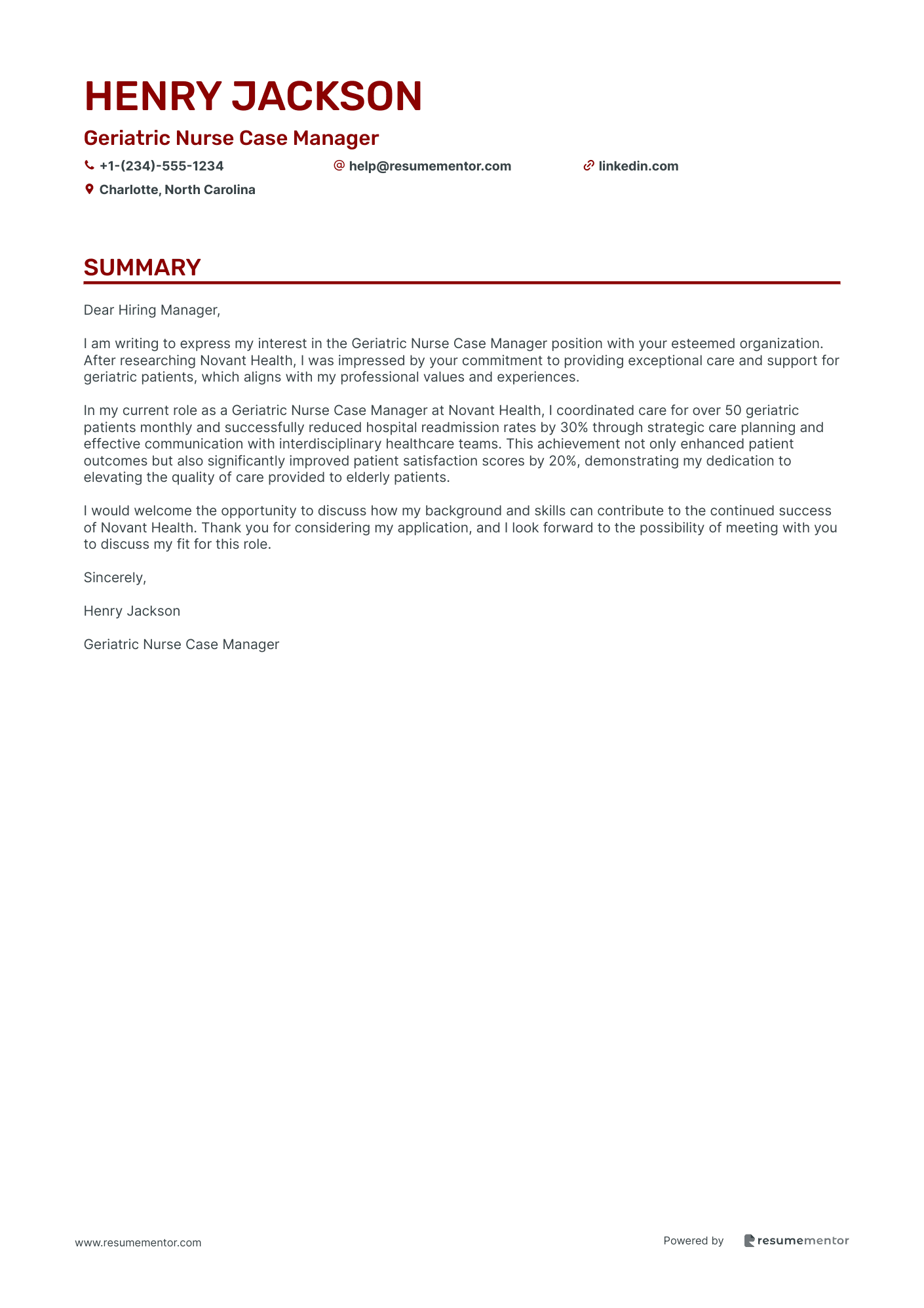
Geriatric Nurse Case Manager
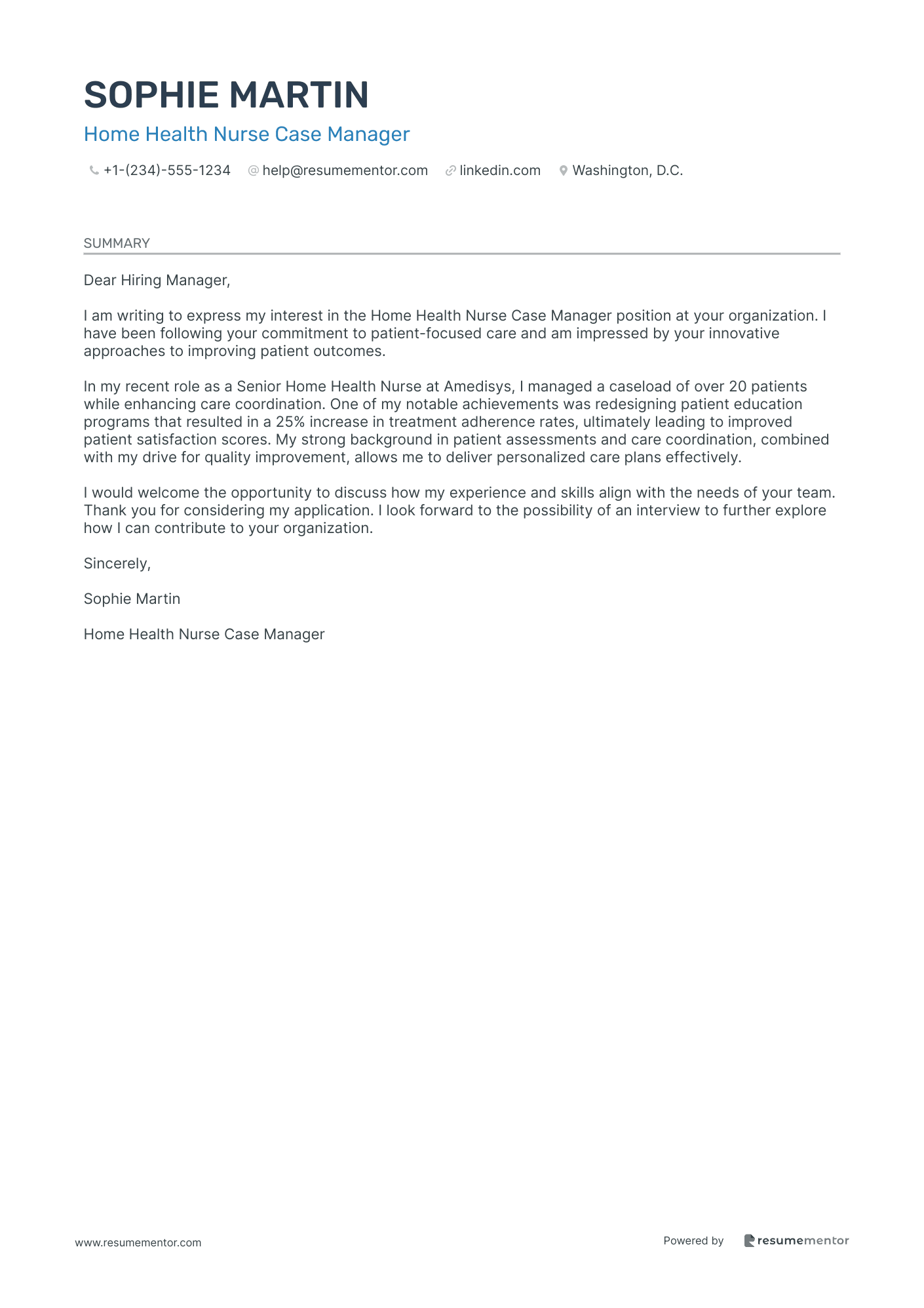
Home Health Nurse Case Manager
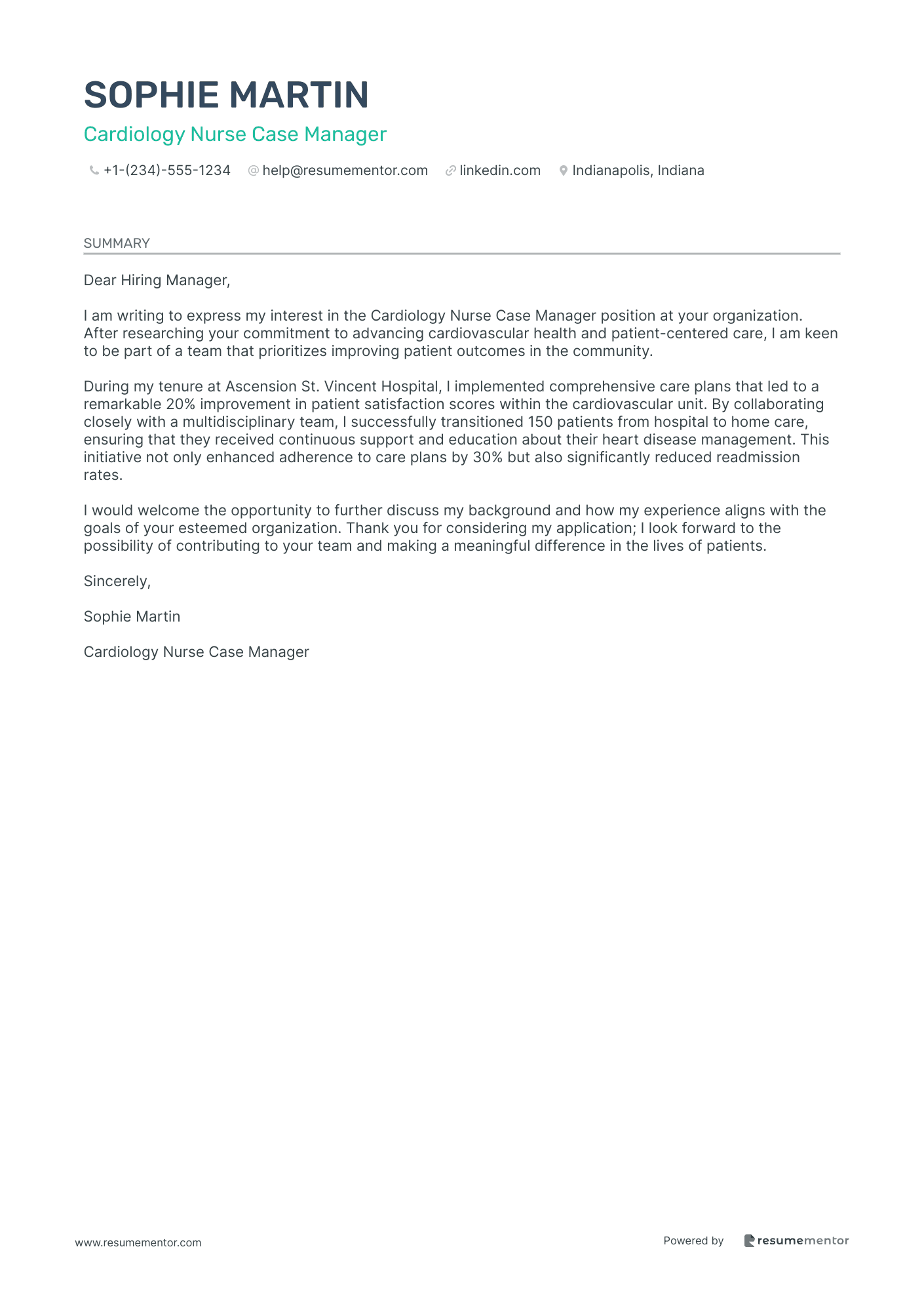
Cardiology Nurse Case Manager
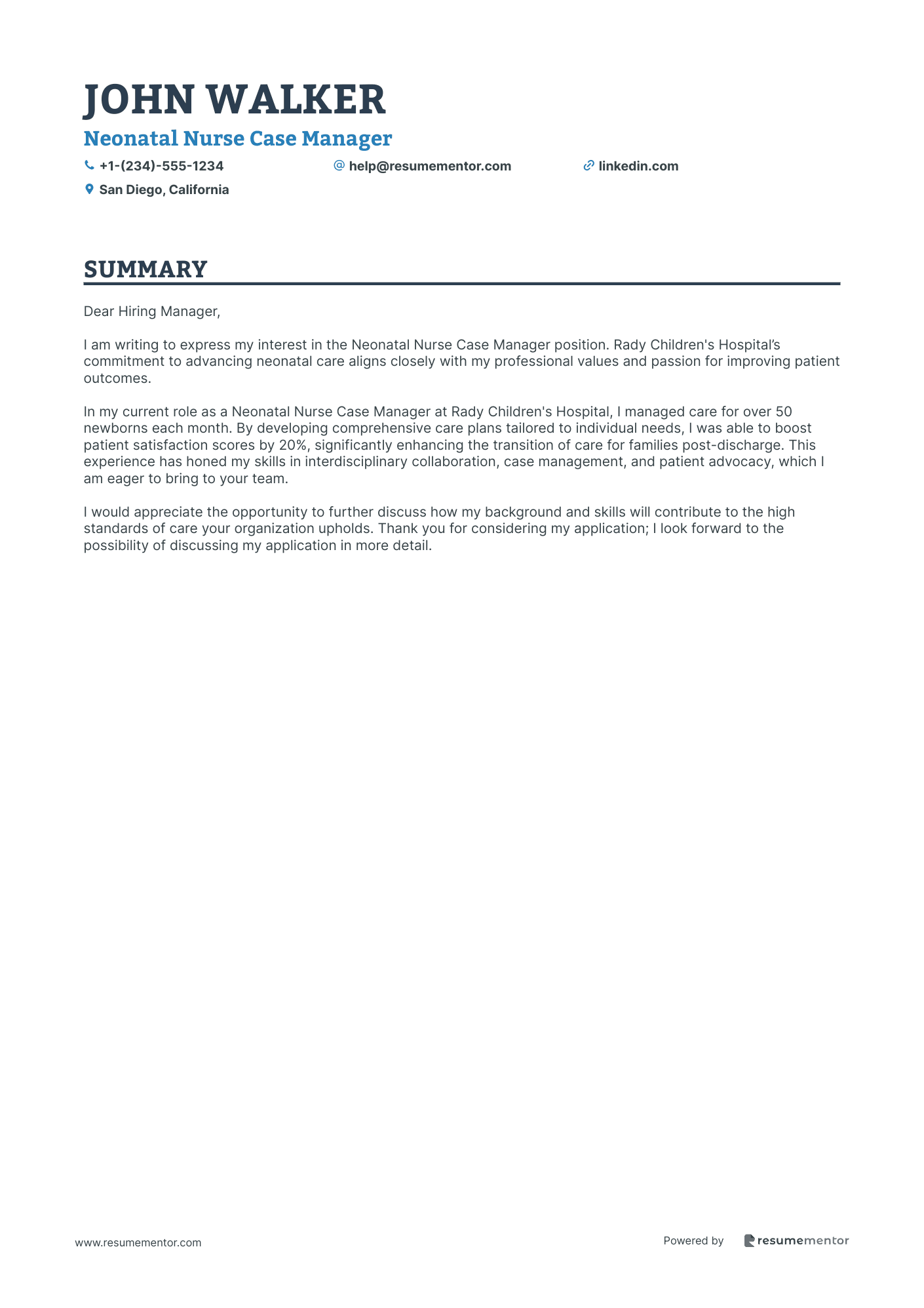
Neonatal Nurse Case Manager
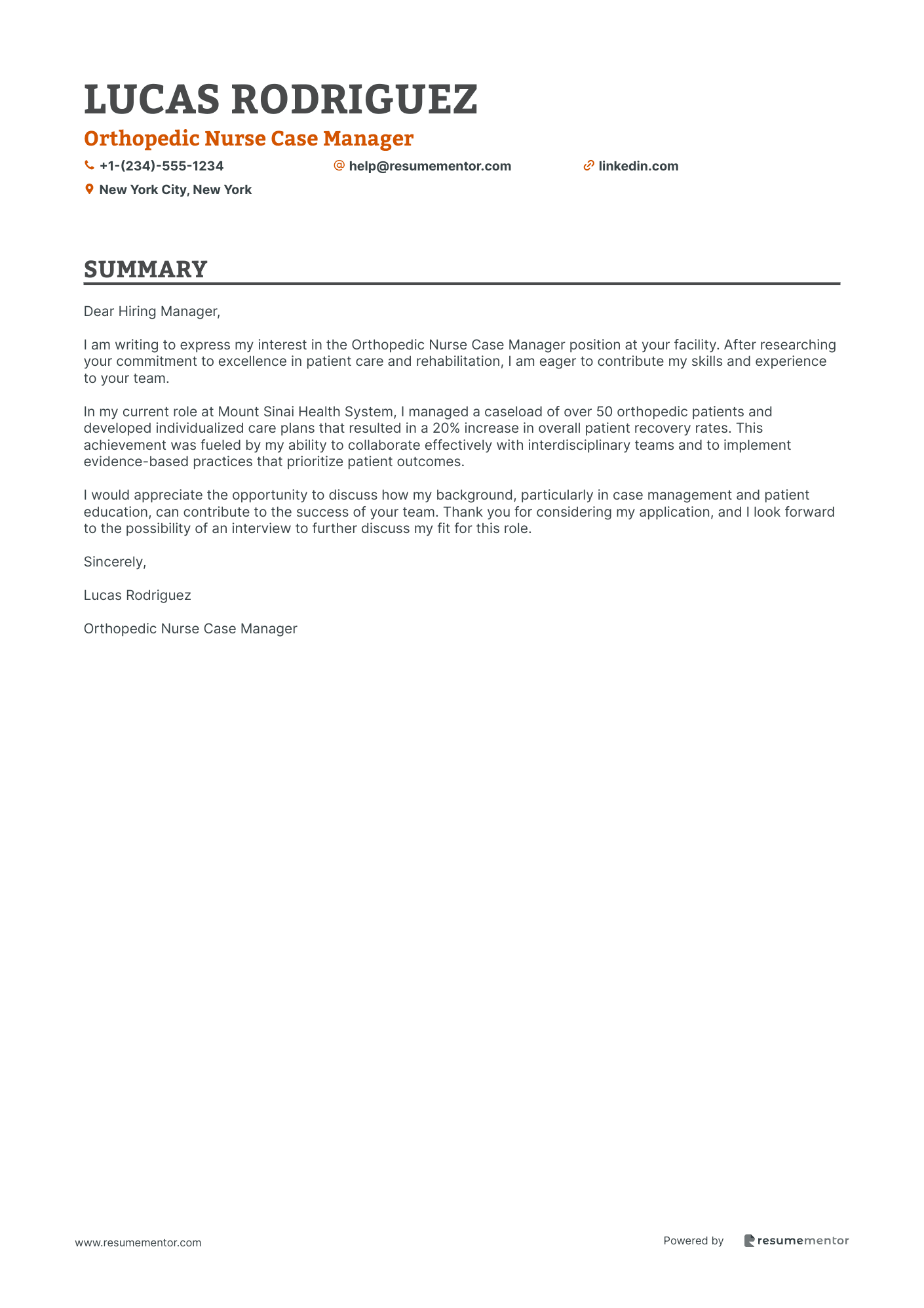
Orthopedic Nurse Case Manager
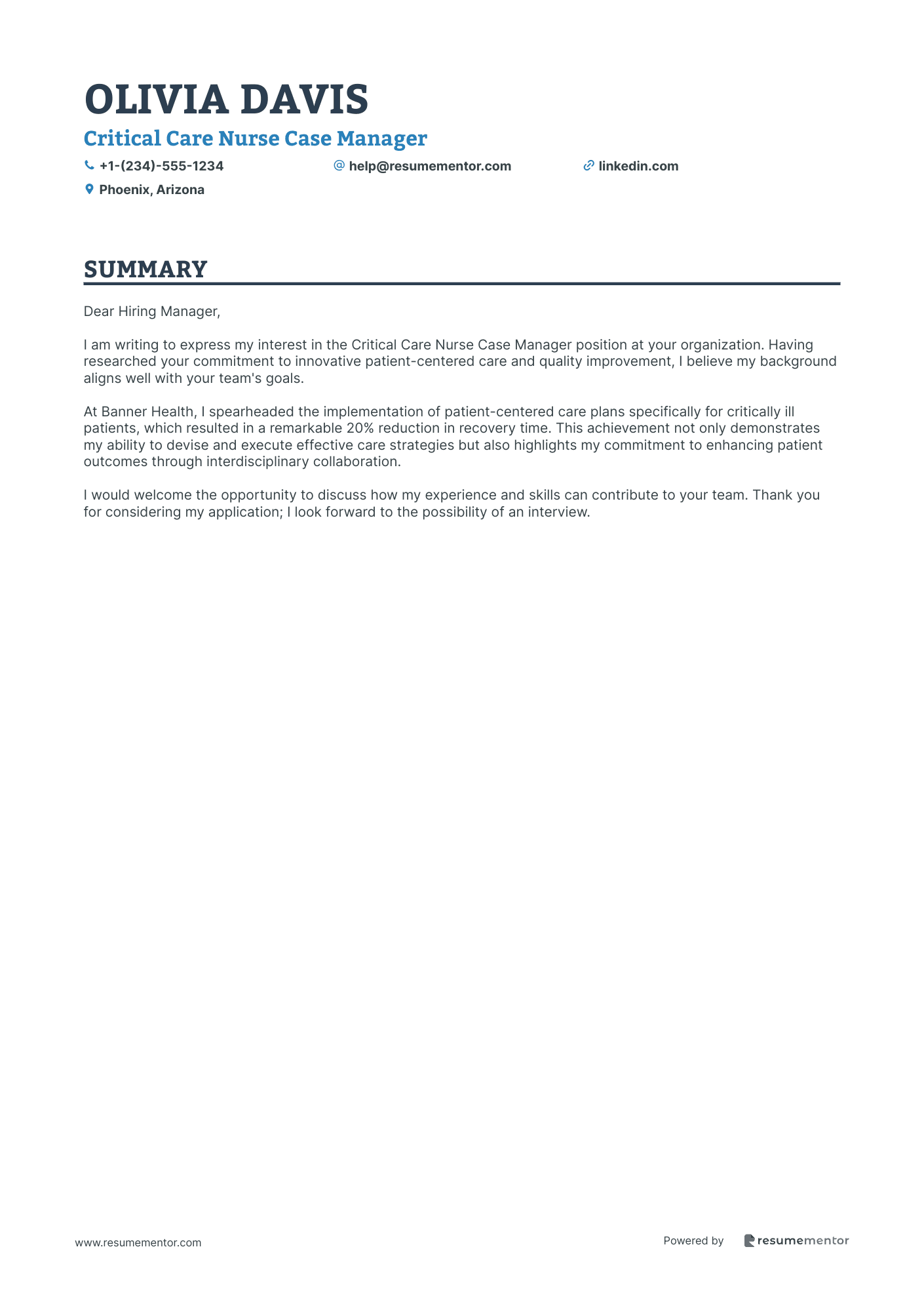
Critical Care Nurse Case Manager
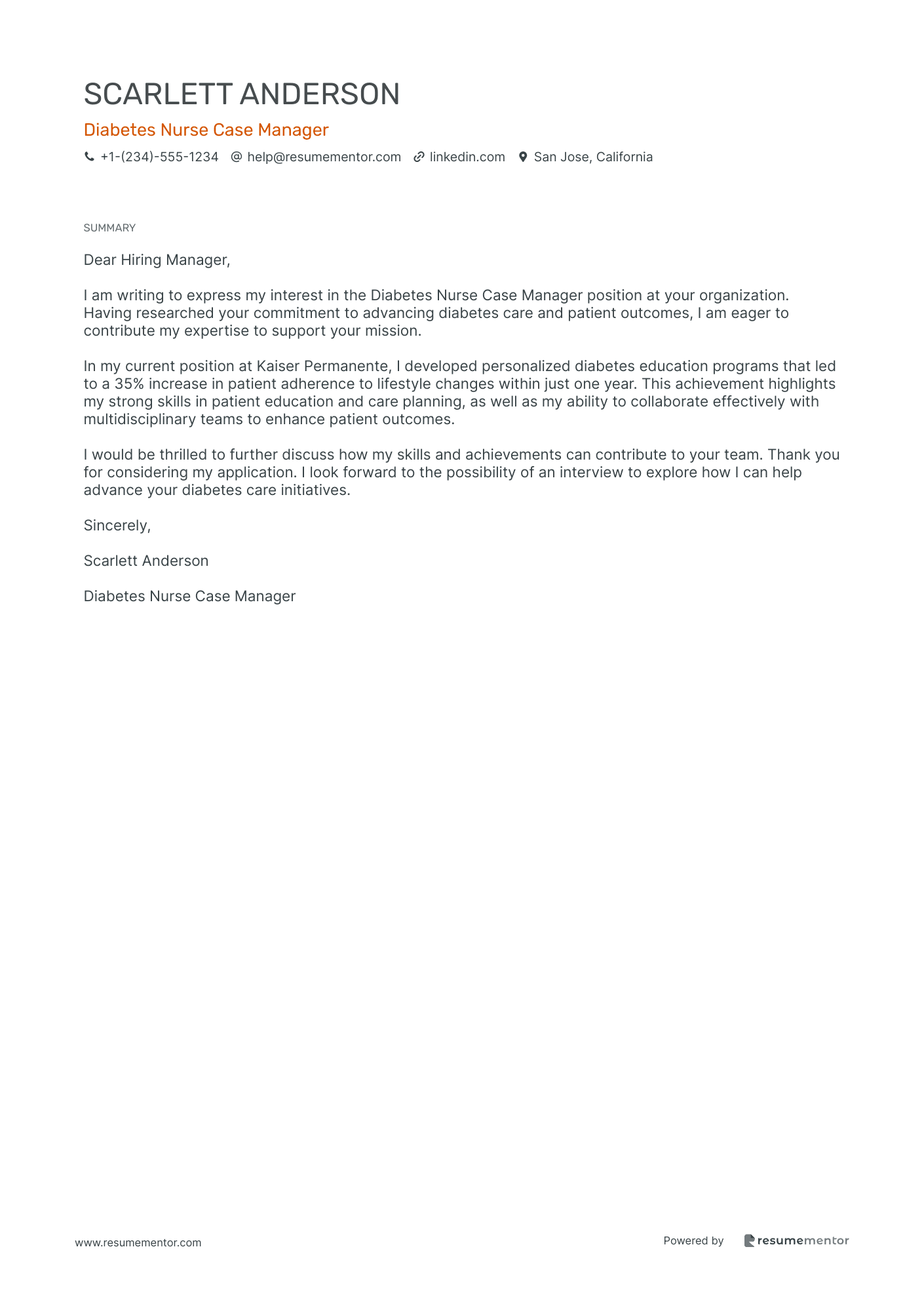
Diabetes Nurse Case Manager

Pediatric Nurse Case Manager cover letter sample
In your cover letter, showcase your clinical experience working with children and adolescents. Emphasize your ability to perform assessments and develop care plans tailored to each child's needs. Include any certifications in pediatric nursing or case management to demonstrate your expertise. Highlight your communication skills when interacting with families and healthcare teams, and provide examples of how you have successfully coordinated care transitions or managed complex cases. Focus on outcomes that resulted from your interventions, showcasing the impact you made on patient health and support.
Samuel Moore
Pediatric Nurse Case Manager
Summary
Dear Hiring Manager,
I am writing to express my interest in the Pediatric Nurse Case Manager position at your organization. I have been impressed by your commitment to enhancing pediatric health outcomes and your innovative approaches to care coordination.
In my most recent role at NewYork-Presbyterian Hospital, I designed over 150 individualized care plans each year, leading to a 15% boost in patient satisfaction scores. My proficiency in interdisciplinary collaboration not only streamlined care but also facilitated a 10% reduction in hospital stays within my first year. This experience honed my ability to manage complex case loads while ensuring high standards of patient care.
I welcome the opportunity to discuss how my background and skills can contribute to your team and further your mission in pediatric healthcare. Thank you for considering my application; I look forward to the possibility of an interview.
Sincerely,
Samuel Moore
Pediatric Nurse Case Manager
Oncology Nurse Case Manager cover letter sample
When crafting your cover letter, focus on your clinical experience in oncology and any specialized training you have completed. Highlight your ability to coordinate care, as well as your experience in educating patients about their treatment options. Discuss any experience with patient advocacy and how it's improved your patients’ outcomes. Include examples of how you have collaborated with multidisciplinary teams to achieve effective care plans. Mention any certifications or ongoing education relevant to oncology to demonstrate your commitment and expertise in the field.
Lucas Rodriguez
Oncology Nurse Case Manager
Summary
Dear Hiring Manager,
I am writing to express my interest in the Oncology Nurse Case Manager position at your organization. Having closely followed Fox Chase Cancer Center's commitment to innovative cancer care and patient advocacy, I am eager to contribute to your mission in supporting cancer patients and their families.
In my current role at Fox Chase Cancer Center, I developed personalized care plans that improved treatment adherence by 15%. This achievement not only illustrates my capability in care plan development but also demonstrates my dedication to enhancing patient outcomes through diligent coordination and education. My experience in organizing multidisciplinary team meetings has further streamlined communication, resulting in elevated patient satisfaction levels by 30%.
I welcome the opportunity to discuss how my skills and experiences can contribute to your team's success. Thank you for considering my application; I look forward to the possibility of an interview.
Psychiatric Nurse Case Manager cover letter sample
When applying for this role, it's important to showcase any previous experience in mental health or nursing. Highlight your skills in patient assessment, care planning, and crisis intervention. If you've completed relevant training or certifications, such as Mental Health First Aid or Trauma-Informed Care, include these to demonstrate your commitment and expertise. Provide specific examples that illustrate how your interventions have improved patient outcomes, using a 'skill-action-result' framework. This approach will show your direct impact on patient care and highlight your qualifications effectively.
Anthony Harris
Psychiatric Nurse Case Manager
Summary
Dear Hiring Manager,
I am writing to express my interest in the Psychiatric Nurse Case Manager position at your esteemed organization. I have followed your impactful work in mental health care and deeply admire your commitment to providing holistic support to patients.
In my current role at Ascension Seton Medical Center, I successfully led crisis intervention efforts that resulted in de-escalating 90% of emergency situations within the hospital's mental health unit. This accomplishment not only highlights my crisis intervention skills but also my dedication to ensuring patient safety and well-being during critical times.
I would welcome the opportunity to further discuss how my background, skills, and passions align with the needs of your team. Thank you for considering my application; I look forward to the possibility of contributing to your organization and enhancing patient care together.
Sincerely,
Anthony Harris, Psychiatric Nurse Case Manager
Geriatric Nurse Case Manager cover letter sample
When applying for this role, it’s important to highlight any previous experience in geriatric care or nursing. Focus on your patient assessment and care planning skills. Mention certifications like 'Geriatric Care Management' or relevant continuing education courses, noting the timeframes involved. Examples of how you've effectively coordinated care for seniors, managed complex health issues, or improved patient outcomes can strengthen your application. Use the 'skill-action-result' framework to demonstrate your contributions. Showcase your empathy and communication skills, as these are crucial for working with elderly patients and their families.
Henry Jackson
Geriatric Nurse Case Manager
Summary
Dear Hiring Manager,
I am writing to express my interest in the Geriatric Nurse Case Manager position with your esteemed organization. After researching Novant Health, I was impressed by your commitment to providing exceptional care and support for geriatric patients, which aligns with my professional values and experiences.
In my current role as a Geriatric Nurse Case Manager at Novant Health, I coordinated care for over 50 geriatric patients monthly and successfully reduced hospital readmission rates by 30% through strategic care planning and effective communication with interdisciplinary healthcare teams. This achievement not only enhanced patient outcomes but also significantly improved patient satisfaction scores by 20%, demonstrating my dedication to elevating the quality of care provided to elderly patients.
I would welcome the opportunity to discuss how my background and skills can contribute to the continued success of Novant Health. Thank you for considering my application, and I look forward to the possibility of meeting with you to discuss my fit for this role.
Sincerely,
Henry Jackson
Geriatric Nurse Case Manager
Home Health Nurse Case Manager cover letter sample
When applying for this role, it’s vital to showcase your clinical experience in home health settings. Highlight your familiarity with care plans, patient assessments, and medication management. Emphasize strong interpersonal skills to build rapport with patients and families. Include any relevant certifications, like BLS or ACLS, and specify their duration to underline your commitment to ongoing education. Provide specific examples of how you improved patient outcomes or streamlined processes, using a 'skill-action-result' format to demonstrate your impact on healthcare delivery.
Sophie Martin
Home Health Nurse Case Manager
Summary
Dear Hiring Manager,
I am writing to express my interest in the Home Health Nurse Case Manager position at your organization. I have been following your commitment to patient-focused care and am impressed by your innovative approaches to improving patient outcomes.
In my recent role as a Senior Home Health Nurse at Amedisys, I managed a caseload of over 20 patients while enhancing care coordination. One of my notable achievements was redesigning patient education programs that resulted in a 25% increase in treatment adherence rates, ultimately leading to improved patient satisfaction scores. My strong background in patient assessments and care coordination, combined with my drive for quality improvement, allows me to deliver personalized care plans effectively.
I would welcome the opportunity to discuss how my experience and skills align with the needs of your team. Thank you for considering my application. I look forward to the possibility of an interview to further explore how I can contribute to your organization.
Sincerely,
Sophie Martin
Home Health Nurse Case Manager
Cardiology Nurse Case Manager cover letter sample
When applying, emphasize your clinical experience in cardiology or relevant healthcare settings. Highlight your ability to assess patient needs and develop care plans. You're encouraged to mention certifications or training in areas like heart failure management or cardiac rehabilitation. Share specific examples of how your interventions improved patient outcomes, using a 'skill-action-result' format. Additionally, demonstrate your teamwork and communication skills, as collaborating with healthcare teams is essential. Showing your commitment to professional development, such as attending workshops or conferences, can further strengthen your application.
Sophie Martin
Cardiology Nurse Case Manager
Summary
Dear Hiring Manager,
I am writing to express my interest in the Cardiology Nurse Case Manager position at your organization. After researching your commitment to advancing cardiovascular health and patient-centered care, I am keen to be part of a team that prioritizes improving patient outcomes in the community.
During my tenure at Ascension St. Vincent Hospital, I implemented comprehensive care plans that led to a remarkable 20% improvement in patient satisfaction scores within the cardiovascular unit. By collaborating closely with a multidisciplinary team, I successfully transitioned 150 patients from hospital to home care, ensuring that they received continuous support and education about their heart disease management. This initiative not only enhanced adherence to care plans by 30% but also significantly reduced readmission rates.
I would welcome the opportunity to further discuss my background and how my experience aligns with the goals of your esteemed organization. Thank you for considering my application; I look forward to the possibility of contributing to your team and making a meaningful difference in the lives of patients.
Sincerely,
Sophie Martin
Cardiology Nurse Case Manager
Neonatal Nurse Case Manager cover letter sample
When applying for this role, focus on your clinical experience with newborns, particularly in high-risk situations. Emphasize your assessment skills and ability to develop care plans tailored to individual patient needs. Highlight any relevant certifications, such as Neonatal Resuscitation Program (NRP) or Pediatric Advanced Life Support (PALS), and include details of your hands-on training. Discuss instances where your advocacy improved patient outcomes or streamlined care processes, using a 'skill-action-result' framework to clearly demonstrate your impact in previous positions.
John Walker
Neonatal Nurse Case Manager
Summary
Dear Hiring Manager,
I am writing to express my interest in the Neonatal Nurse Case Manager position. Rady Children's Hospital’s commitment to advancing neonatal care aligns closely with my professional values and passion for improving patient outcomes.
In my current role as a Neonatal Nurse Case Manager at Rady Children's Hospital, I managed care for over 50 newborns each month. By developing comprehensive care plans tailored to individual needs, I was able to boost patient satisfaction scores by 20%, significantly enhancing the transition of care for families post-discharge. This experience has honed my skills in interdisciplinary collaboration, case management, and patient advocacy, which I am eager to bring to your team.
I would appreciate the opportunity to further discuss how my background and skills will contribute to the high standards of care your organization upholds. Thank you for considering my application; I look forward to the possibility of discussing my application in more detail.
Orthopedic Nurse Case Manager cover letter sample
When writing your cover letter, emphasize your clinical experience in orthopedic care. Highlight any certifications, such as in wound care or pain management, to demonstrate your expertise. Strong assessment and critical thinking skills are essential, so provide specific examples of how you've effectively developed and implemented care plans. Mention instances where your advocacy improved patient outcomes. Focus on your ability to collaborate with multidisciplinary teams, showcasing how your contributions led to increased efficiency or better recovery rates, using a 'skill-action-result' format.
Lucas Rodriguez
Orthopedic Nurse Case Manager
Summary
Dear Hiring Manager,
I am writing to express my interest in the Orthopedic Nurse Case Manager position at your facility. After researching your commitment to excellence in patient care and rehabilitation, I am eager to contribute my skills and experience to your team.
In my current role at Mount Sinai Health System, I managed a caseload of over 50 orthopedic patients and developed individualized care plans that resulted in a 20% increase in overall patient recovery rates. This achievement was fueled by my ability to collaborate effectively with interdisciplinary teams and to implement evidence-based practices that prioritize patient outcomes.
I would appreciate the opportunity to discuss how my background, particularly in case management and patient education, can contribute to the success of your team. Thank you for considering my application, and I look forward to the possibility of an interview to further discuss my fit for this role.
Sincerely,
Lucas Rodriguez
Orthopedic Nurse Case Manager
Critical Care Nurse Case Manager cover letter sample
When crafting your cover letter, prioritize your clinical experience in critical care settings. Highlight any certifications, such as CCRN or CMC, that demonstrate your expertise. Discuss your ability to assess patient needs and coordinate necessary services, ensuring comprehensive care. Use specific examples of how your interventions improved patient outcomes or streamlined processes. Mention your collaboration with interdisciplinary teams to emphasize your teamwork skills. Focus on your ability to educate patients and families, showcasing how your communication skills foster understanding and compliance with treatment plans.
Olivia Davis
Critical Care Nurse Case Manager
Summary
Dear Hiring Manager,
I am writing to express my interest in the Critical Care Nurse Case Manager position at your organization. Having researched your commitment to innovative patient-centered care and quality improvement, I believe my background aligns well with your team's goals.
At Banner Health, I spearheaded the implementation of patient-centered care plans specifically for critically ill patients, which resulted in a remarkable 20% reduction in recovery time. This achievement not only demonstrates my ability to devise and execute effective care strategies but also highlights my commitment to enhancing patient outcomes through interdisciplinary collaboration.
I would welcome the opportunity to discuss how my experience and skills can contribute to your team. Thank you for considering my application; I look forward to the possibility of an interview.
Diabetes Nurse Case Manager cover letter sample
When writing your cover letter, focus on your experience with diabetes management and patient education. Highlight any certifications like Certified Diabetes Educator (CDE) or training in diabetes care. Detail your ability to assess patient needs and create individualized care plans, showcasing your hands-on experience. Share specific examples of how you improved patient outcomes through structured follow-ups or lifestyle coaching. Use the 'skill-action-result' framework to demonstrate your interventions' effectiveness, emphasizing how your contributions led to better glycemic control or increased patient satisfaction.
Scarlett Anderson
Diabetes Nurse Case Manager
Summary
Dear Hiring Manager,
I am writing to express my interest in the Diabetes Nurse Case Manager position at your organization. Having researched your commitment to advancing diabetes care and patient outcomes, I am eager to contribute my expertise to support your mission.
In my current position at Kaiser Permanente, I developed personalized diabetes education programs that led to a 35% increase in patient adherence to lifestyle changes within just one year. This achievement highlights my strong skills in patient education and care planning, as well as my ability to collaborate effectively with multidisciplinary teams to enhance patient outcomes.
I would be thrilled to further discuss how my skills and achievements can contribute to your team. Thank you for considering my application. I look forward to the possibility of an interview to explore how I can help advance your diabetes care initiatives.
Sincerely,
Scarlett Anderson
Diabetes Nurse Case Manager
Related Articles

Continue Reading
Check more recommended readings to get the job of your dreams.
Resume
Resources
Tools
© 2026. All rights reserved.
Made with love by people who care.
